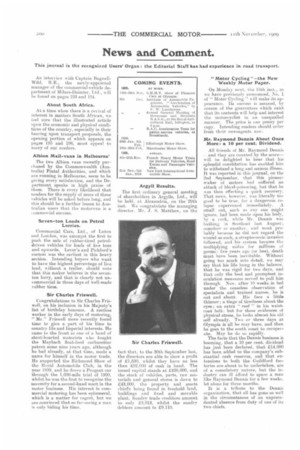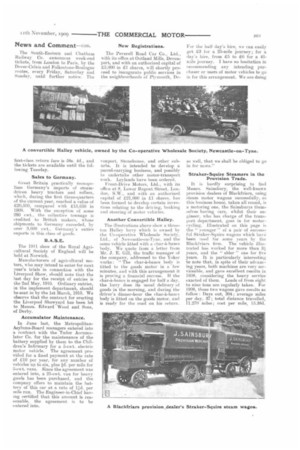News and Comment.
Page 10

Page 11

If you've noticed an error in this article please click here to report it so we can fix it.
This journal is the recognized Users' Organ: the Editorial Staff has had experience in road transport.
An interview with Captain llagnallWild, RE., the newly-appointed ma.nager of the commercial-vehiele department of Milnes-Daimler, Ltd., will be found on pages 193 and 194.
About South Africa.
At a time when there is a revival of interest in matters South African, we feel sure that the illustrated article -upon the economic and physical conditions of the country, especially in their bearing upon transport proposals, the opening portion of which appears on pages 195 and 196, must appeal to many of our readers.
Albion Mail-vans in Melbourne' The two Albion vans recently purchased by the Commonwealth (Australia) Postal Authorities, arid which are running in Melbourne, seem to he giving every satisfaction, and the Department speaks in high praise of them. There is every likelihood that tenders for the supply of more of these -vehicles will be asked before long, and -this should be a further lesson to Australian users that the motorvan is a eommercial success.
Seven-ton Loads on Petrol Lorries.
Commercial Cars, Ltd., of Luton and London, was amongst the first to push the sale of rubber-tired petroldriven vehicles for loads of five tons and upwards. Lever's and Pickford's custom was the earliest in this heavy section. Intending buyers who want to have the highest percentage of live load, without a trailer, should note that this maker believes in the seventon lorry, and that is clearly not uncommercial in these days of well-made rubber tires.
Sir Charles Friswell.
Congratulations to Sir Charles Eris-well, on his inclusion in his Majesty's list of birthday honours. A restless worker in the early days of motoring, " Mr." Friswell more recently found time to give a part of his time to -country life and Imperial interests. He came to the front as one of 0 hand of stout-hearted motorists who fought the Mayba,eh float-feed carburetter patent some nine years ago, although he had already, at that time, made a name for himself in the motor trade. He supported the Richmond Show of the Royal Automobile Club, in the year 1.999, and he drove a Peugeot car through the 1,000-mile trial of 1900, whilst be was the first to recognise the necessity for a second-hand mart in the motor husinesa. His interest hi commercial motoring has been ephemeral, which is a matter for regret, but we are convinced that so far-seeing a man is only biding his time.
Argyll Results.
The first ordinary general meeting of shareholders in Argylls, Ltd., will be held. at Alexandria, on the 29th inst. We congratulate the managing director. Mr. .T. S. Matthew, on the fact that, to the 30th September last, the directors are able to show a profit of £1,630, whilst they have no less than £92,000 of cash in hand. The issued capital stands at i.:426,0610, and the stock of vehicles, parts, raw materials and general stores is down to £43,000, the property and assets chiefly being found in freehold land, buildings and fixed and movable plant. Sundry trade creditors amount to only £3,013, whilst the sundry debtora amount to £9.110.
." Motor Cycling "—the New Weekly Motor Paper.
On Monday next, the 15th inst., as we have previously announced, No. 1 of " Motor Cycling " will make its appearance. Its 80 mesa is assured, by reason of the guarantees which exist that its contents will help and interest the motorcyclist in an unequalled manner. The price is one penny per copy. Intending readers should order from their newsagents now.
Mr. Raymond Dennis About Once More : a 10 per cent. Dividend.
All friends; of Mr. Raymond Dennis and they are counted by the score— will be delighted to hear that his splendid constitution has enabled him to withstand a long and serious illness. It was reported in this journal, on the 2nd September, that this pioneer maker of motors had suffered an attack of bload-poisonieg, but that he was then effecting a quick recovery. 'That news, however, was literally too good to be true, ler a dangerous relapse supervened immediately. A small cut, such. as-ally one might ignore, had been made upon his body, by a rock, while Mr. Dennis was bathing in Scotlaiel last August.; somehow or another, and most probably because he did not regard the wound as such, a streptecoccic invasion followed, and his system became the multiplying nid-u s for millions oE germs five years ago (or lesa), death must have been inevitable. -Without going too much into detail, we may say that his life hung in the balance, that he was rigid for two days, and that only the beat and promptest inoculation measures served to pull him through. Now, after 10 weeks in bed under the ceaseless observation of specialists and trained nureas, he is out and about. His face a. little thinner ; a tinge of tiredness about the eyes ; an extra " reef " in his waistcoat belt: but for these evidences of physical stress, he looks almost his old self already. Two or three days at Olympia is all he may have, and then he goes to the south coast to recuperate. May he do SO rapidly.
The facts that the Dennis business is booming, that a 10 per cent, dividend has just been declared, that £14,000 has been added to the company's aubstantial cash reserves, and that extensions to both the Guildford factories are about to he undertaken, are of a consolatory nature, but the industry can ill afford to spare a man like Raymond Dennis for a. few weeks, let alone for three months.
It is a tribute to the Dennis organization, that all has gone so well in the circumstances of an unprecedented absence from duty of one of ita two chiefs. The South-Eastern and Chatham Railway Co. announces week-end tickets, from London to Paris, by the Dover-Calais and Folkestone-Boulogne routes, every Friday, Saturday and Sunday, until further notice. The first-class return fare is 588. 4d., and the tickets are available until the following Tuesday.
Sales to Germany.
Great Britain practically monopolizes Germany's imports of steamdriven heavy tractors and rollers, which, during the first three-quarters of the current year, reached a value of £20,500, compared with £15,650 in 1908. With the exception of some 280 cwt., the collective tonnage is credited to British makers, whose shipments to Germany exceeded, by over 3,600 cwt., Germany's entire exports in this class of goods.
R.A.S.E.
The 1911 show of the Royal Agricultural Society of England will be held at Norwich.
Manufacturers of agricultural motors, who may intend to enter for next year's trials in connection with the Liverpool Show, should note that the last day for the receipt of entries is the 2nd May, 1910. Ordinary entries, in the implement department, should be sent in by the 1st March, 1910. We observe that the contract for ereeting the Liverpool Showyard has been let to Messrs. Edward Wood and Sons, of Derby.
Accumulator Maintenance.
In June last, the MetropolitanAsylums-Board managers entered into a contract with the Tudor Accumulator Co. for the maintenance of the battery supplied by them to the Children's Infirmary for a 5-cwt. electric motor vehicle. The agreement provided for a fixed payment at the rate of £10 per year, for any number of vehicles up to six, plus fd. per mile for 5-cwt. vans. Since the agreement was entered into, a 2.5-cwt. van for heavy goods has been purchased, and the company offers to maintain the battery of this car at a rate of 11d. per mile run. The Engineer-in-Chief having certified that this amount is reasonable, the agreement is to be catered into.
New Registrations.
The Peverell Road Car Co., Ltd., with its office at Outland Mills, Devonport, and with an authorized capital of £5,000 in Li shares, will shortly proceed to inaugurate public services in the neighbourhoods of Plymouth, De vonport. :qonehouse, and other suburbs. It is intended to develop a parcel-carrying business, and possibly to undertake other motor-transport work. Leylands have been ordered. Front-Drive Motors, Ltd., with its office at 8, Lower Regent Street, London, S.W., and with an authorized capital of £21,000 in IA shares, has been formed to develop certain inventions relating to the driving, braking and steering of motor vehicles.
Another Convertible Halley.
Ths illustrations above show a threeton Halley lorry which is owned by the Co-operative Wholesale Society. Ltd., of Neweastle-on-Tyne, and the same vehicle fitted with a char-it-banes body. We quote from a letter from Mr. J. E. Gill, the traffic manager of the company, addressed to the Yoker works: "The char-k-banes body is fitted to the goods motor in a few minutes, and with this arrangement it is proving a financial success. If the char-a-bancs is engaged for half a day. the lorry does its usual delivery of goods in the morning, and during the driver's dinner-hour the ehar-a-banes body is fitted on the goods motor, and is ready for the road on his return.
For the half day's hire, we can easily get £3 for a 25-mile journey; for a day's hire, from £5 to £6 for a 40mile journey. I have no hesitation in recommending any intending purchaser or users of motor vehicles to go in for this arrangement. We are doing so well, that we shall be obliged to go in for mare."
Straker-Squire Steamers in the Provision Trade.
It is hardly surprising to find Messrs. Sainsbury, the well-known provision dealers of Blackfriars, using steam motor wagons successfully, as this business house, taken all round, is a motoring one, the Sainsburys themselves having cars, whilst their engineer, who has charge of the transport department, goes in for motorcycling. Illustrated on this page is the " younger " of a pair of successful Straker-Squire wagons which have been used for some years by the Black friars firm. The vehicle illustrated has worked for more than 31 years, and the " elder" one for five years. It is particularly interesting to note that, in spite of their advancing years, both machines are very serviceable, and gave excellent results in 1908, considering the heavy service exacted of them. Loads of from eight to nine tons are regularly taken. For 1908, these two wagons gave results as follow : Days out, 304; average miles per day, 37; total distance travelled, 11.270 miles ; cost per mile, 15.38d.






















